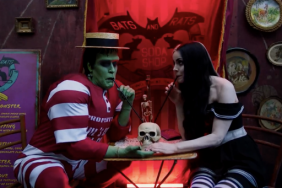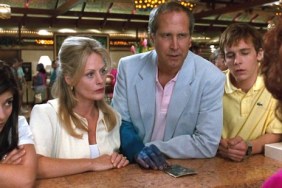“Have you seen anything good yet?”
“Yeah, I saw this amazing Norwegian movie called Blind.”
“Oh really, what’s it about?”
“It’s about… Um… Fuck…”
I’ve lost track of how many times I’ve had that conversation at Sundance 2014 already. It’s supposed to be the perfect icebreaker, “Have you seen anything good yet?” But a film like Blind, while exceptional and quite possibly the best movie here, is a tricky thing to describe. It’s the inside of a person’s head, with a plot that reads like an erotic thriller or a twee metatext, and it’s absolutely beautiful but difficult to explain because the story was meant to unfold in the cinema, not in a blurb or – god help me – a review.
Ever the professional, however, here I try: Ellen Dorit Peterson plays Ingrid, a woman who lost her sight and has begun to lose her ability to visualize her surroundings. She refuses to leave her apartment, but her husband Morten (Henrik Rafaelson) is free to venture wherever he chooses, and in his desperation to connect with someone – anyone – now that his wife is stuck in geographic and psychological seclusion, he winds up having an extramarital affair with Nina (Vera Vitali), a single mother stalked by another man with an addiction to pornography.
Or is that what it’s about? Writer/director Eskil Vogt understands the significance of telling a story from a single character’s perspective, and in Blind he has chosen Ingrid, a woman whose knowledge of the events outside her apartment and even her own head are limited, unreliable, and perhaps nothing more than an expression of her overwhelming anxiety about her newfound disability. Locations of conversations between her husband and an old college chum change mid-scene between a café and the subway, because really, Ingrid has no idea where the hell they really were. Morten’s dates with Nina are subject to whatever Ingrid happens to be hearing while she tells the audience what they’re up to, and their trysts eventually succumb to her darkly humorous, vengeful, spontaneous whims.

The events that occur inside her apartment aren’t much more reliable. Since she doesn’t even know what it looks like, the size and shape of the flat sometimes varies, and the probably mundane tasks her husband performs around her are equally subject to her paranoid interpretation. Is he writing an e-mail or livechatting with a lover? Does he touch himself while Ingrid undresses or has he stopped thinking about her sexually? Did he really go to work, or has he been watching Ingrid in secret all day…?
It’s a dangerous affectation for a film to embrace (unfortunate memories of the John Candy vehicle Delirious are unavoidable), but by the time Eskil Vogt and his protagonist begin to really play with the possibilities, the comic situations Ingrid concocts and the little tragic possibilities she toys with are easily recognizable as a significant expression of a woman with a unique point of view and an avid, poignant imagination, writing the story of her life and the lives of those around her with a reckless disregard for exactitude, and an open willingness to make it up as she goes along. But all the little jokes and obvious falsehoods represent Ingrid’s genuine fears and fantasies, presented with humor and eroticism and suspense by a storyteller who lacks confidence, perhaps, in her storytelling but with something important to say about this cast of memorable, fully realized characters. Or perhaps it’s all only important to Ingrid herself.
Blind exists as a nebulous construction, ever shifting but ultimately centered around a lovely and funny love-quadrangle with curious characters and consistent insight. The film’s curious blend of the sensual and the cerebral manages to engage even when you begin to lack confidence about whether anything is actually happening at all. It’s all real because Ingrid wills it so, because Eski Vogt films it with an impressive clarity that Ingrid herself lacks, and because a good therapist would have a field day with the protagonist’s every little assumption and consenting lie.
But by the time I’d be able to tell someone all that, they’ve probably already had to rush off to their next screening. Pity. Well, I hope they’re seeing Blind. It’s a sexy, funny and thrilling trip through the human imagination, and possibly the best cinematic interpretation ever of a chaotic but promising first draft, writ large in front of our eyes by a creative storyteller and the creative storyteller telling her story.

William Bibbiani is the editor of CraveOnline’s Film Channel and co-host of The B-Movies Podcast. Follow him on Twitter at @WilliamBibbiani.








